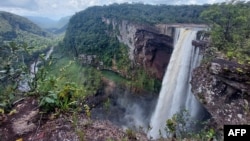Venezuela has turned up the volume on its insistence that it has a rightful claim to Essequibo, a region encompassing the majority of the territory of Guyana, its neighbor to the east. However, the government of President Nicolás Maduro has little to no support from its regional neighbors or intergovernmental organizations.
The Venezuelan claim, bolstered by a national referendum Sunday in its favor, has prompted criticism from governments in both South America and the Caribbean, as well as a warning from the International Court of Justice. On Friday, the court ruled that Venezuela “must refrain from taking any action which would modify” Guyana’s current control of the territory.
In recent months, Venezuela has further increased tensions by deploying military resources to its border with Guyana, and announcing that it has plans to install an airstrip in the area to provide logistical support for the development of Essequibo.
Over the weekend, Guyana President Mohamed Irfaan Ali said his country does not intend to surrender any territory to Venezuelan control, and called on the Maduro government to moderate its behavior.
“I want to advise Venezuela that this is an opportunity for them to show maturity, an opportunity for them to show responsibility, and we call upon them once more [to] join us in ... allowing the rule of law to work and to determine the outcome of this controversy,” Ali said in remarks to his countrymen.
Stunt gone wrong
Christopher Sabatini, a senior fellow for Latin America at the London-based foreign policy think tank Chatham House, told VOA that the referendum in Venezuela had all the hallmarks of a publicity stunt that got out of control, and which now threatens to degenerate into serious conflict.
“This was mostly for domestic consumption, but basically, the Maduro government has pulled the trigger on something and we don't know where it's going to go,” Sabatini told VOA.
Maduro took over the country in 2013, after the death of former president Hugo Chavez, and persisted with policies that have debilitated Venezuela’s economy. The legitimacy of the Maduro government has been questioned internationally since 2019, after Maduro held on to power despite apparently losing the presidential election the previous year. With a new election scheduled for 2024, the Essequibo referendum was seen as an effort to galvanize voters behind the government.
Now, despite evidence of poor turnout and low voter engagement with the referendum, Sabatini said, the Maduro government is doubling down.
“If you listen to the rhetoric, both last night and today from Maduro and members of the government … instead of being chastened, or instead of trying to move on, we see a crescendo of bellicose rhetoric, which should be troubling.”
Roots of the dispute
Essequibo, a sparsely developed area of 160,000 square kilometers, makes up the western two-thirds of Guyana, which is located on South America’s northern Atlantic coast between Venezuela to the west and Suriname to the east. Both Venezuela and Guyana border Brazil to the South.
The Venezuelan government has long claimed Essequibo, despite the fact that the region has been recognized by the international community, first as part of British Guiana and then as part of the independent Cooperative Republic of Guyana, for more than 100 years.
The Venezuelan claim is largely based on the fact that during the colonial period, Essequibo and Venezuela were both administered by Spain. As part of a settlement reached by an international arbitration panel in 1899, Essequibo was ruled to be part of British territory. All of modern day Guyana gained independence in 1966.
The International Court of Justice is currently considering the validity of Venezuela’s claim in a plea brought by the Maduro government in 2018, but is believed to be years away from issuing a decision.
The border dispute gained salience in 2015, after oil firm ExxonMobil proved that there are billions of barrels worth of commercially accessible crude oil deposits located off the coast of Essequibo in Guyana’s territorial waters.
Little regional support
On Sunday, the government in Caracas conducted a referendum asking the Venezuelan people whether they believed the country should declare Essequibo a Venezuelan state. Despite media reports that showed nearly empty polling places and other signs of low voter turnout, the Maduro government claimed that 10.5 million votes were cast, more than in the last presidential election. Of those, it said 95% were in favor of declaring Essequibo part of Venezuela.
In recent months, Venezuela has raised tensions in the region by shifting military assets to areas near its border with Guyana. It also claims to have begun construction of a military airfield near the border.
The Maduro government’s claim to Essequibo has little to no support from other leaders in the region, with major regional intergovernmental organizations issuing statements critical of the decision to hold the referendum.
The Organization of American States rejected the Venezuelan referendum when it was announced, saying in a statement, “We condemn this improper use of a referendum because it is illegal according to the 1966 Geneva Agreement, and because similar misuses of this instrument have served as a pretext in the recent past to try to justify the worst actions between States, including the crime of aggression.”
Similarly the Caribbean Community (CARICOM) warned that a positive vote on the referendum, while not legally valid for purposes of international law, could be interpreted as endorsing the annexation of Essequibo by military force. In a statement, it said, “CARICOM insists that the referendum proposed by Venezuela has no validity, bearing, or standing in international law… but its summary effect is likely to undermine peace, tranquility, security, and more, in our region.”










